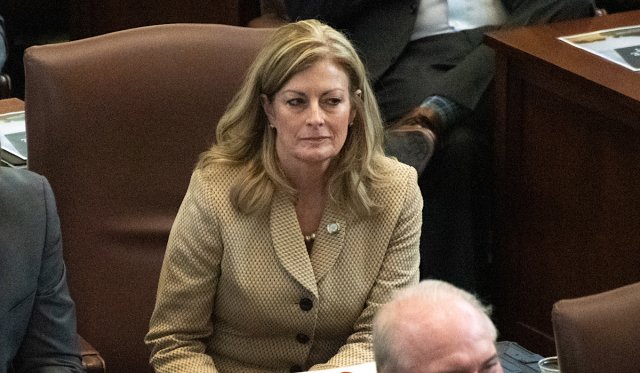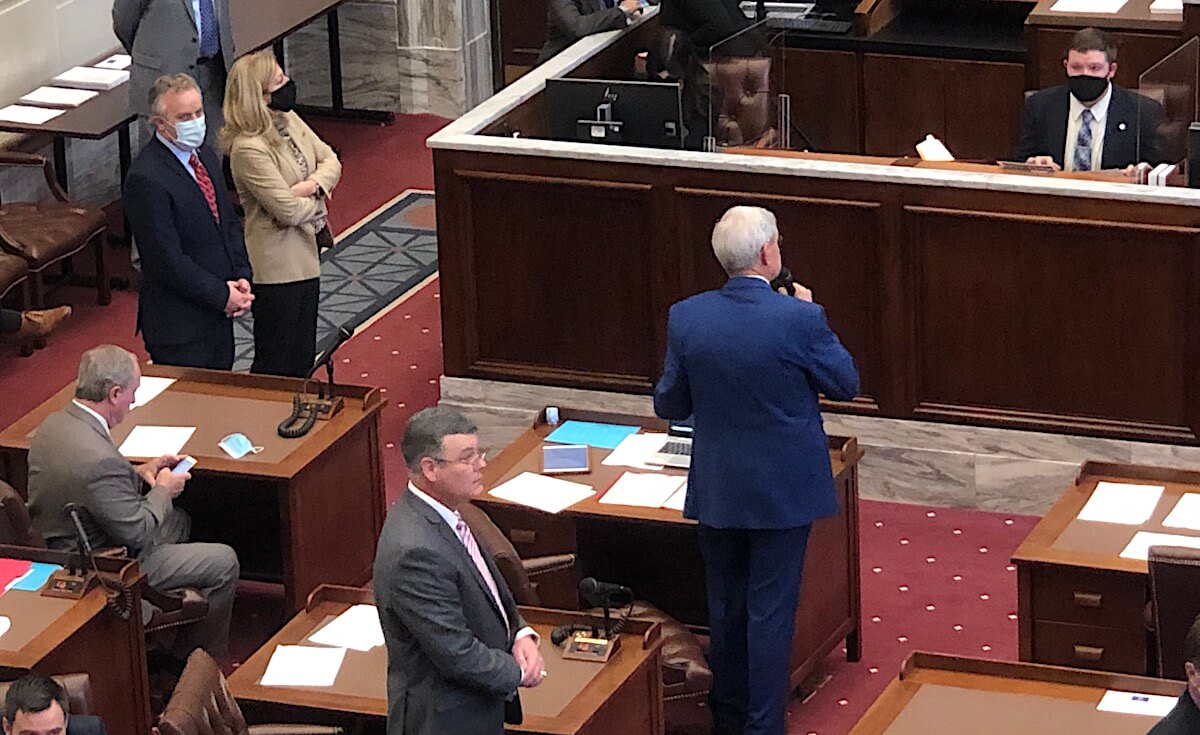

(Editor’s note: The day after this story published, Sen. Kim David provided NonDoc with a letter noting that she had been censured, which contradicted her denial in the story below. This story remains unchanged, but you can read her letter here.)
Senate Floor Leader Kim David has spoken with colleagues about “misunderstandings” regarding comments she made at a Friday press conference on third-party managed Medicaid, but she said the fact another senator is leading floor work this week is unrelated.
“It’s a good break. It’s a good time to do it. I’m coming off of COVID,” she said. “It’s been an exhausting experience to have COVID. It was a good time to let Sen. Simpson step up and get some experience in.”
David said rumors that her absence as floor leader this week was intended to be a cooling off period were inaccurate.
“No, I wouldn’t describe that as being right,” said David (R-Porter). “That didn’t have anything to do with it.”
But the influential senator, who has been the body’s most vocal advocate for the implementation of third-party managed Medicaid, did say she spoke with her Republican colleagues and Senate President Pro Tempore Greg Treat (R-OKC) after she opined Friday on the reasons some legislators oppose contracting with private entities to manage various parts of the state Medicaid program, called SoonerCare.
“As to the few members who are against this (…) some of those who have been outspoken about it don’t exactly understand what the concept is,” David said Friday. “They know what they’ve been told, and they know they should be afraid. And then I have several who stand to gain by keeping the system the way it is.”
This afternoon, she emphasized that she did not mean to disrespect anyone and spoke to Treat about the matter.
“We definitely had a conversation. I’ve had that conversation with my members about my comments,” David said. “I hope we’re past some misunderstandings about my comments. I never meant to imply that anybody in my caucus was in any way corrupt or stupid. I respect my caucus tremendously.”
Some fear ‘unintended yet significant financial consequences’

Leading the Senate floor in David’s stead since Monday has been Assistant Majority Floor Leader Frank Simpson (R-Springer).
David was not in the chamber for discussion of Wednesday’s lone bill — SB 1031, which advanced unanimously to extend the legality of video or teleconference meetings for public bodies — but she entered as soon as voting began, cast her vote in favor of the measure and stood with Treat while Simpson concluded his duties as floor leader.
Treat’s deputy chief of staff and director of communications, Aaron Cooper, said after Wednesday’s session that the Senate leader had no comment on the matter at this time.
Senate Health and Human Services Committee Chairman Greg McCortney (R-Ada) has expressed skepticism about the benefits of third-party Medicaid managed care, which Gov. Kevin Stitt has pushed as a top health care priority for the past year. On Jan. 20, nine GOP senators signed a letter urging Stitt to reconsider on the topic.
McCortney was not one of those senators, but in September he held an interim study looking at whether third-party managed care “could have unintended yet significant financial consequences for the state if Indian health care services are not handled correctly.”
On Friday after David’s press conference remarks, McCortney replied to a journalist on Twitter with a sarcastic reference to his colleague’s words.
Can you explain it using small words? I heard today that I’m probably too dumb to understand how awesome this will be. Hoping some smart ethical person can explain it to me.
— Greg McCortney (@gmccortney) January 30, 2021
Wednesday, McCortney declined to describe his or the Senate Republican Caucus’ reaction to David’s controversial remark.
“That’s probably not a story I want to comment on,” McCortney said with a laugh. “I think the pro tem may be able to answer that question better than me.”
Cooper said Treat is expected to hold a media availability at some point Thursday before noon.
David ‘passionate about trying to get better health outcomes’
While internal party caucus conversations are typically private, David’s support for the governor’s managed care plan is quite public. Third-party managed Medicaid involves the Oklahoma Health Care Authority contracting with private entities to conduct care compliance and other intended cost-saving measures for Medicaid populations.
“I’m passionate about trying to get better health outcomes for Oklahoma,” David said. “We’ve been 46th to 48th in the nation forever, so if we can let the free market come in and be innovative to get some wrap-around services for better health outcomes (…) that’s what this is all about.”
David repeated a statement made by Stitt during his State of the State address Monday: that private managed care has “worked well” for 40 other states’ Medicaid programs.
“The free market can be more innovative than a state agency can be,” she said. “It’s not just about the availability of health care. That’s not how you get better health outcomes. It’s those wrap-around services and it’s making sure people change their behaviors to get those better outcomes. So I have been very passionate about that.”
Several health care provider associations have questioned the purported successes of other states. In Kansas, for instance, providers reported problems with reimbursement processes. A report from the state auditor in Iowa said more than half of Medicaid-accepting providers in the Hawkeye State believe the state’s program has been harmed since private managed care companies were contracted with in 2016.
“How can sending our tax dollars to an out-of-state private insurance company that operates with significantly higher administrative costs save money while maintaining the same level of care and the same number of dentists who provide that care?” Oklahoma Dental Association director Lynn Means said at a recent OHCA meeting. “The math simply does not add up.”
Oklahoma’s Medicaid agency has not yet announced its award of the dental managed care contract, but four other companies were announced as receiving contracts Friday during the press conference at which David spoke.
Wednesday, David said she hopes the awarding of those contracts means the issue is already moving forward in a way that the Legislature cannot derail.
“I am hoping it is. Contracts have been awarded. I’ve asked all of those companies to really start meeting with those providers that have concerns, so I think that needs to happen,” she said. “Every one of those companies that received those contracts need to get out there and really talk to the providers and allay their fears and talk about what we’re going to be able to do and do it right.”
She acknowledged past challenges in the state regarding private managed care, but she said times are different.
“It did not work in the 90s. I think we can learn from mistakes,” David said. “I think we can learn from what other states have done good or bad. So let’s pick the best and get it done in Oklahoma.”
She added that perhaps the Legislature could take action to prevent the decrease of Medicaid provider rates, a common fear among health care groups and rural lawmakers.
“We can always protect provider rates. I have not seen the RFPs. I know in discussions in years past we have always talked about protecting those provider rates,” David said. “Because we have to make sure that our providers will accept the patients and we pay our providers to do the job.”
(Update: This story was updated at 8 p.m. Wednesday, Feb. 3, to reference a tweet from McCortney.)




















